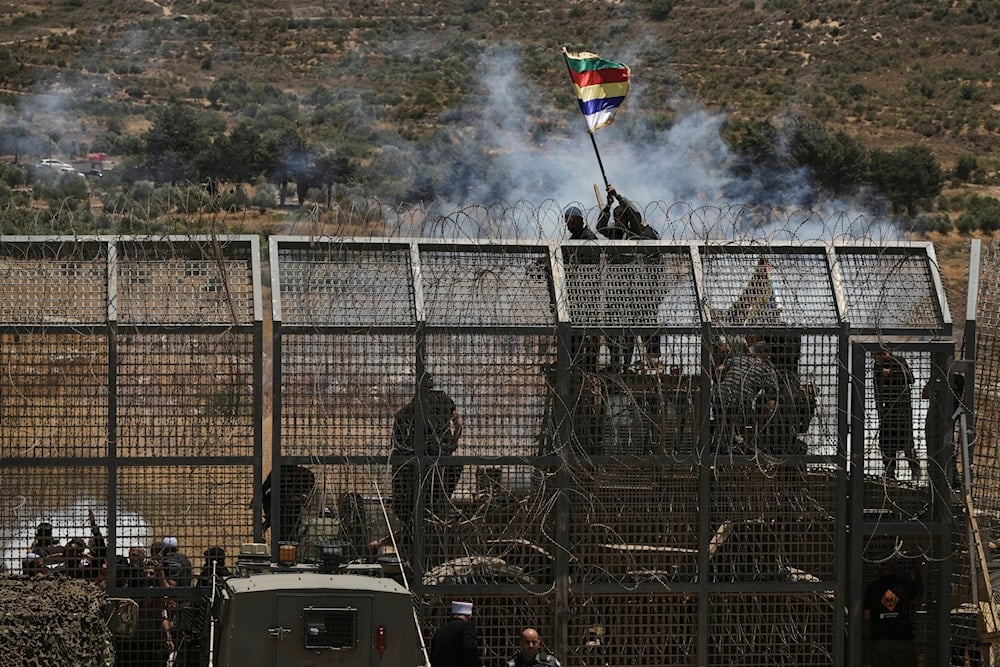'Israel', Syria agree to de-escalate amid Paris meeting: Al Monitor
"Israel" and Syria agree to de-escalation measures during a US-mediated meeting in Paris, as tensions rise in southern Syria.
-

Syrian Druze protest near the occupied Palestinian-Syrian border, as seen from the town of Majdal Shams in the Israeli-occupied Golan Heights, on July 16, 2025. (AP Photo/Leo Correa)
In an unprecedented political development, Syrian Foreign Minister Hassan al-Shibani met with senior Israeli officials in Paris on Thursday, with mediation led by US envoy to Syria, Tom Barrack, wrote Ben Caspit on The Monitor on Friday.
According to the report, the high-level meeting included Israeli Strategic Affairs Minister Ron Dermer and National Security Advisor Tzachi Hanegbi, both close to Prime Minister Benjamin Netanyahu, marking the culmination of months of quiet backchannel negotiations, strongly encouraged by US President Donald Trump.
Barrack posted on X following the meeting: "The aim of the Paris meeting was dialogue and de-escalation, and that is exactly what we achieved. All parties reaffirmed their commitment to continue these efforts."
Paris has long been the diplomatic heart of vital discussions like those we shared today. A stable, secure, and unified Syria is built on the foundation stone of great neighbors and allies. In the words of @SecRubio, conflicts end thanks to “hard, vibrant diplomacy that the U.S.… pic.twitter.com/hFsqSHKpOf
— Ambassador Tom Barrack (@USAMBTurkiye) July 25, 2025
According to Caspit, the urgency of the talks was driven by the recent violent clashes in southern Syria between the Druze and Bedouin groups. But the situation escalated when Israeli forces intervened on the side of the Druze in Sweida, amid alleged efforts to block the entrenchment of extremist groups in the border region.
US mediation faces strategic dilemmas
As mediator, Tom Barrack is navigating two major challenges, according to Caspit. First, the reconstituted Syrian army includes units with previous affiliations to al-Qaeda and ISIS.
Second, a divide persists between US and Israeli strategies in Syria. While the US supports Interim President Ahmad al-Sharaa’s efforts to "rebuild a unified Syrian state" through inclusive agreements with minority groups such as the Kurds and Druze, "Israel" reportedly prefers a fragmented Syria, with areas of influence divided among Turkey, Damascus, and its forces.
Speaking to the Associated Press (AP) ahead of the summit, Barrack said, "Strong nation-states are a threat, especially Arab states are viewed as a threat to Israel. But in Syria, I think all the minority communities are smart enough to say, 'We’re better off together, centralized.'"
Barrack also criticized "Israel’s" military intervention, saying, "The United States was not asked, nor did they participate in that decision… Israel’s intervention creates another very confusing chapter and came at a very bad time."
Agreement on Suweida and Southern Syria
The four-hour Paris meeting resulted in an agreement between the US, Syria, and "Israel" to de-escalate tensions in southern Syria.
Caspit details that all government troops and Bedouin militias are set to withdraw from Sweida, with the Druze community assuming responsibility for security and civil administration, according to the Syrian Observatory for Human Rights. Additionally, US monitors will oversee the implementation of the agreement, while UN access will be permitted, but Syrian government forces will be excluded.
A senior Israeli military source described the outcome as "a significant Israeli and Druze achievement. The Druze are in control of their fate, and the central government will not be responsible for their security."
"Israel" has come under mounting internal pressure from its own Druze minority, many of whom serve in its military and police. Community leaders have demanded that the government act to protect their brethren in Syria and warned of strained relations should it fail to do so.
A senior Israeli diplomatic source told Al-Monitor: "We have no choice. We are going with the Americans to stabilize the situation on the ground."
The agreement includes a clause, reportedly demanded by "Israel", to demilitarize the towns of al-Quneitra and Daraa, near the occupied Golan Heights. Additionally, local Druze committees will be allowed to bear light arms for internal security.
"It’s no secret that we will not allow extremist elements to build terror infrastructure near our border," said the Israeli official, adding that "This area should be demilitarized, and this is the only way to calm tensions throughout the entire sector."

 4 Min Read
4 Min Read








